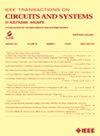A Compact and Efficient Hardware Accelerator for RNS-CKKS En/Decoding and En/Decryption
IF 4
2区 工程技术
Q2 ENGINEERING, ELECTRICAL & ELECTRONIC
IEEE Transactions on Circuits and Systems II: Express Briefs
Pub Date : 2024-09-03
DOI:10.1109/TCSII.2024.3454024
引用次数: 0
Abstract
To accelerate RNS-CKKS, little attention is paid to the acceleration of the operations on the edge-client. However, the devices used by the edge-client are often low-end and have limited resources and computing power, so the performance of RNS-CKKS encoding, decoding, encryption and decryption also needs to be improved. Consequently, we propose a compact and efficient hardware accelerator architecture named CAEA for these operations. In order to improve the compactness of CAEA, a reconfigurable butterfly unit is proposed, which considers both complex number arithmetic and integer modular arithmetic, so that FFT/IFFT and NTT/INTT can be executed on unified hardware processing elements without additional resource and waste. Moreover, in order to improve the computational efficiency, we also improved the dataflow of encoding, decoding, encryption, and decryption on CAEA to reduce the number of required operations and latency. CAEA is synthesized based on SMIC 40nm technology, and is also implemented on Xilinx Kintex-7 and Zynq UltraScale+ FPGA. Compared with the prior related works, in terms of performance, CAEA can achieve用于 RNS-CKKS 开/解码和开/解密的紧凑高效硬件加速器
为了加速RNS-CKKS,很少关注边缘客户端操作的加速。然而,边缘客户端使用的设备往往是低端设备,资源和计算能力有限,因此RNS-CKKS编码、解码、加解密的性能也需要提高。因此,我们提出了一种紧凑高效的硬件加速器架构,命名为CAEA。为了提高CAEA的紧凑性,提出了一种考虑复数运算和整数模运算的可重构蝶形单元,使FFT/IFFT和NTT/INTT可以在统一的硬件处理单元上执行,而不会产生额外的资源和浪费。此外,为了提高计算效率,我们还改进了CAEA上的编码、解码、加密和解密的数据流,以减少所需的操作次数和延迟。CAEA基于中芯国际40nm工艺合成,并在赛灵思Kintex-7和Zynq UltraScale+ FPGA上实现。与之前的相关工作相比,在性能上,CAEA可以实现$2.01\times $的编码和解码加速,$1.13\times \sim ~87.86\times $的加密加速,$3.03\times \sim ~69.64\times $的解密加速。与目前的工作相比,CAEA的面积效率提高了1.06 ~4.96倍。
本文章由计算机程序翻译,如有差异,请以英文原文为准。
求助全文
约1分钟内获得全文
求助全文
来源期刊
CiteScore
7.90
自引率
20.50%
发文量
883
审稿时长
3.0 months
期刊介绍:
TCAS II publishes brief papers in the field specified by the theory, analysis, design, and practical implementations of circuits, and the application of circuit techniques to systems and to signal processing. Included is the whole spectrum from basic scientific theory to industrial applications. The field of interest covered includes:
Circuits: Analog, Digital and Mixed Signal Circuits and Systems
Nonlinear Circuits and Systems, Integrated Sensors, MEMS and Systems on Chip, Nanoscale Circuits and Systems, Optoelectronic
Circuits and Systems, Power Electronics and Systems
Software for Analog-and-Logic Circuits and Systems
Control aspects of Circuits and Systems.

 求助内容:
求助内容: 应助结果提醒方式:
应助结果提醒方式:


